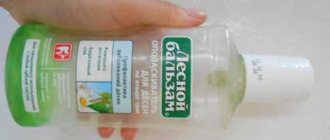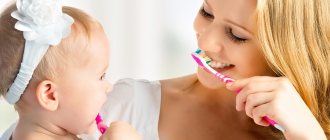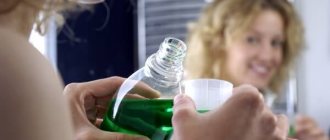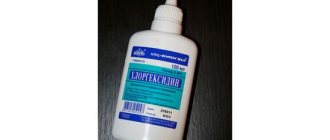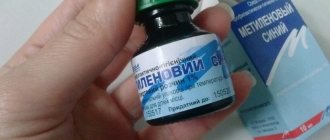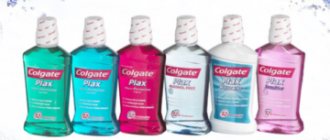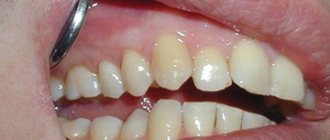Healthy and snow-white teeth are the calling card of every person. To keep our teeth in good condition, we regularly brush them and visit the dentist. But sometimes regular brushing is not enough, and then Listerine mouthwash comes to the rescue.
Mouth rinses:
- give fresh breath;
- prevent the development of caries and destruction of tooth tissue;
- eliminate inflammatory processes of various etiologies.
Features and composition of Listerine mouth rinse
Listerine is able to have an effect due to the fact that it contains many useful components. Below we consider what active substances are included in the composition:
- Menthol is an effective antiseptic component, eliminates odors from the mouth, and acts against inflammation.
- Eucalyptus – fights bacteria, removes swelling of the mucous membrane.
- Thymol – fights yeast fungi and resists the proliferation of pathogenic microorganisms. Timol is able to relieve itching and has an antiseptic effect.
- Methyl salicylate - eliminates painful discomfort, stimulates blood flow to the gums.
Among the auxiliary components:
- Fluoride – saturates with macro- and microelements.
- Zinc chloride - can soften deposits on teeth.
- Alcohol – promotes the effective interaction of components.
The manufacturer competently approached the selection of components, as a result of which a highly effective composition was created.
Below we will consider the main properties of Listerine:
- Quickly removes plaque on teeth.
- Prevents the growth of bacteria.
- Quickly eliminates unpleasant odor.
- Relieves swelling of the gums.
- Eliminates inflammation of the mucous membrane.
When the composition enters the oral cavity, its active components begin to act, eliminating unpleasant odor, plaque and providing protection against bacteria.
Action
The action of Listerine mouthwash is aimed at destroying pathogenic microflora that is present on the oral mucosa and develops by feeding on food debris.
Without proper care of your gums and tongue, these microorganisms multiply and can spread throughout the body.
Thanks to the composition of the drug, developed and tested by scientists, the action of Listerine is aimed exclusively at pathogenic microorganisms, without harming the natural microflora of the oral cavity.
In addition to eliminating bacteria, Listerine mouthwash performs the following functions:
- prevents the formation of plaque, which transforms into stone;
- destroys the protective shell of microbes and reduces the activity of the enzymes they produce;
- promotes the formation of a protective layer on the mucous membrane that prevents the emergence and spread of new pathogenic microorganisms;
- strengthens tooth enamel, reduces its sensitivity;
- improves blood circulation in gum tissue;
- reduces inflammatory processes occurring in the gums;
- eliminates unpleasant odor from the oral cavity.
Listerine children's mouth rinse
Listerine for children over six years of age is an excellent product for baby hygiene. Manufacturers understand that when brushing their teeth, children miss hard-to-reach places where pathogenic bacteria that cause dental diseases accumulate. Therefore, a highly effective product for the care of baby teeth was developed. Baby mouthwash can clean up to one hundred percent of the entire mouth. Does not contain alcohol and sugar. Children's Listerine will protect baby teeth from caries. This is a great way to ensure effective cleaning and protection.
Types of rinses by active substances
The effect of a rinse aid depends on the active substances it contains.
With a decoction of herbs.
Herbal mouth rinses are designed to reduce the amount of bacteria in the mouth. However, studies have shown that their effect on the viability of microorganisms is small. A rinse based on a herbal decoction with sage and pine extract is not much different in effectiveness from distilled water. A rinse with chamomile is a little more effective, but still seriously inferior to products with essential oils.*
Contains cetylpyridinium chloride.
Products with 0.05% cetylpyridinium chloride are intended to reduce plaque and combat gum inflammation. However, they have been shown to be less effective in reducing gingivitis inflammation and plaque than essential oil rinses in several studies.
Contains chlorhexidine.
Rinses with chlorhexidine have a local antiseptic effect. But do not forget: they cannot be used for more than 2 weeks, as they significantly disturb the balance of the microflora of the oral cavity. In addition, such products can lead to staining of the enamel.
Contains essential oils.
Essential oil rinses, such as LISTERINE®, are suitable for long-term daily use. Essential oils of menthol, thymol, eucalyptol and methyl salicylate penetrate deeply into the biofilm on the surface of the enamel and eliminate up to 99.9% of bacteria in the oral cavity without inhibiting the growth of normal microflora.
Up to contents
Using Listerine Mouthwash
Listerine can be used regularly. The drug has established itself as an excellent way to prevent gum and dental diseases. If you have problems, you can start using this product after a preliminary consultation with your dentist. Doctors recommend using mouthwash for
- Eliminate unpleasant odor
- Suppression of pathogenic microflora
- Elimination of discomfort after surgery
- Reduce bleeding gums.
Listerine is a multi-functional product that can be used
for various purposes.
Instructions for use
According to the recommendation of dentists, Listerine mouth rinse should be used at least twice a day.
The process is carried out after the usual cleansing of the dentition using a brush, paste and other hygiene products.
The rinsing procedure is carried out as follows:
- about 20 ml of rinsing solution is poured into the glass;
- the liquid is taken into the mouth and rinsed thoroughly for 30 seconds;
- the product is spat out of the mouth.
In order for the use of a rinse aid to achieve maximum effect, the following rules must be observed:
- Do not dilute the drug with water to avoid reducing the concentration of active substances and reducing the antibacterial effect.
- If you experience any discomfort during the first use, reduce the rinse time to 10 seconds, increasing to 30 seconds for subsequent uses.
- The product is not suitable for use by children under 6 years of age, and if it contains alcohol - up to 12 years of age.
- When using Listerine for children under 8-10 years of age, the presence of an adult is recommended.
- It is strictly forbidden to swallow mouthwash.
Find out detailed instructions for using Imudon and patient reviews about the drug. Click here to see photos of Splat toothbrushes.
This address https://dr-zubov.ru/krasota-i-uxod/sredstva/ershiki-dlya-zubov/chetyre-vazhnyx-pokazatelya-pri-vybore.html offers material about dental brushes from Oral Bee and other manufacturers.
Listerine mouth rinse: instructions
How to use Listerine mouthwash
extremely simple and accessible. It is not necessary to dilute it with water before use. According to the instructions provided by the manufacturer, it should be used twice a day. At the initial stage of use, you can increase the frequency of rinsing to three times a day. This will help quickly eliminate unpleasant odor and strengthen your gums. For one procedure, 20 milliliters of the product is enough. You can use the lid as a measuring container. It is advisable to rinse your mouth for thirty seconds to fully engage all areas of the oral cavity. When using the expert series, ten seconds is enough to rinse.
Be sure to pay attention to the fact that under no circumstances should you swallow the mouthwash. According to the instructions for use, the basic series drugs are suitable for adults and children over six years of age. Expert series products can only be used from the age of twelve. Pregnant and breastfeeding women can also use Listerine ,
but very carefully to prevent ingestion. Children are advised to rinse their mouth only under parental supervision.
How to use mouthwash correctly
Listerine is a product for comprehensive and regular oral care. Do not expect that a one-time use of the liquid will bring you the effect declared by the manufacturers. To achieve good results and protect the mucous membranes from pathogenic strains, use Listerine twice a day according to the following regimen:
- For one-time use you will need 4 teaspoons of liquid. Rinse your mouth for 30 seconds and then spit out the solution. By the way, if you use a basic line rinse aid, you do not need to dilute it with water - water will reduce its beneficial properties.
- Many people note that the taste of Listerine is too strong and difficult to get used to right away. Therefore, for the first few uses, reduce the rinsing time - 10 seconds at first will be quite enough. On the fourth day of rinsing, increase the procedure time by 10 seconds, and by another 10 on the fifth. Using this scheme, you can easily get used to and adapt to rinsing for the required 30 seconds.
- Remember that mouthwash should not be swallowed. Its composition can harm the digestive system. If you accidentally ingest large amounts of Listerine, seek medical attention.
Be careful when children use mouthwash. Expert series mouthwashes are prohibited for use by children under 12 years of age. The basic line is limited to 6 years. The child carries out all oral care procedures under the supervision of an adult.
Pregnant women can use the product only after consulting with their doctor. Manufacturers do not indicate restrictions during pregnancy, however, medical consultation will not be superfluous.
Varieties
Let's look at the most popular types of Listerine:
- “Protection against caries” - restores the strength of enamel and fights pathogenic microorganisms. After use, the active substances provide reliable protection for 12 hours.
- “Gum Protection” is an option for people who have gum problems. Maintains soft tissue health and eliminates bleeding gums.
- “Expert whitening” – professionally deals with darkened areas of tooth enamel.
- Listerine Total mouth rinse - the special feature of Listerine Total is that it does not contain alcohol. Listerine Total brightens enamel and provides long-lasting protection. Listerine Total can be purchased at any pharmacy.
- The popularity of Listerine green tea mouthwash is due to its mild effects. Thanks to green tea extract, the drug is able to suppress the activity of pathogenic bacteria. According to user reviews, Listerine with green tea strengthens tooth enamel. Due to the pleasant taste of green tea, your breath remains fresh for 12 hours after use.
- Advanced – aimed at improving metabolic processes, reducing bacterial activity and eliminating tartar.
- Fluoride - a rinse containing fluoride, used to strengthen enamel.
- Cool mint – the refreshing aroma of fresh mint eliminates unpleasant odor and prevents the development of gingivitis.
Summing up
Having examined the Listerine mouthwash, we can draw the following conclusions:
- Listerine is an effective oral hygiene support;
- the economical price of the liquid makes it accessible to anyone;
- you can choose a rinse aid for everyone, aimed at solving their particular problem;
- the method of using the product is simple but highly effective;
- The product must be used 2 times a day, after brushing your teeth.
Regular use of the mouthwash will allow you to achieve healthy teeth and gums, get rid of pathogenic microbes and bacteria, forget about plaque and tartar, gain white teeth and become 100% confident in yourself.
Sources used:
- American Academy of Periodontology. Parameter on acute periodontal diseases.
- Donald L. Bartlett, James B. Steele. Critical Condition: How Health Care in America Became Big Business and Bad Medicine. — 2004.
- Trezubov, Vladimir Nikolaevich. Clinical dentistry: textbook: Study guide. — 2015.
- Rachel Abrams. Adapting Listerine to a Global Market. The New York Times (September 12, 2014)
Listerine mouth rinse: reviews
Listerine rinses, according to reviews from people who use this drug, cope with many dental problems:
- Suppress the activity of harmful microorganisms.
- Suitable for use by children.
- There are no harmful components in the composition.
- Eliminates putrid odor.
- A wide range of.
- Affordable price.
- They do not have a negative effect on the tooth structure.
- Ready-to-use composition.
- Easy to use.
According to dentists, this is a useful remedy for the health of teeth and gums. On the company's website you can read in detail the composition and instructions for use.
When is Listerine contraindicated?
Listerine should not be used by people with the following symptoms:
- increased dry mouth;
- allergies and intolerance to the components included in the mouthwash;
- age up to 6 years (for children from 6 to 12 years old there is a special series of mouthwash, then it is permissible to use regular products from the Listerine line).
The use of Listerine in the presence of contraindications is fraught with a burning sensation in the mouth, increased dryness, and changes in taste perception. If you experience side effects, seek the advice of a qualified healthcare professional immediately.
Advantages
The key advantages of the Listerine line of mouthwashes include the following:
- carefully selected composition of components, eliminating many problems with the mucous membranes and teeth;
- effectiveness of the product in the fight against periodontal diseases;
- safety of the product for human health;
- a wide range of products allowing you to choose a product in accordance with a specific pathology of the oral cavity;
- Possibility of use by children.
In the video, watch the dentist’s opinion about the benefits and necessity of using the product.
Traditional ways to get rid of bad breath
To treat halitosis at home you can:
Have apples for breakfast. This simple folk method of getting rid of halitosis is very effective - your breath will be fresh all day; Finish each meal with roasted almonds or a pinch of ginger root; Wipe your gums with a weak soda solution after each meal.
Traditional medicine can also help get rid of bad breath. These include: Decoctions and tinctures; Teas.
